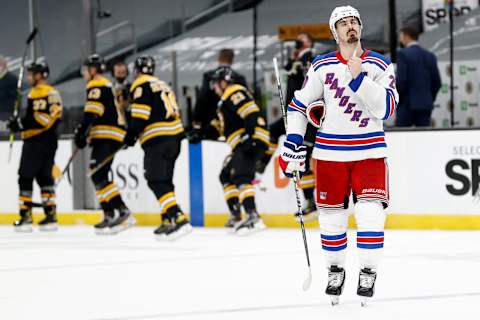Why this Rangers team is not going to succeed


There has been one theme this season for the New York Rangers that has been disturbing. They have not shown an ability to deal with adversity. They fall behind and seem to fold. They don’t have what it takes to mount a comeback and they are fragile. One bad goal and it sends the team into a tailspin.
The 4-0 loss to Boston was a perfect example. When the Bruins scored a shorthanded goal at 17:34 of the first period, it was described by Coach David Quinn as a “back breaker”. Yes, a goal with over 42 minutes left in the game and a deficit of two goals was the death blow that the team couldn’t recover from. He was right, how the team came out in the second period told the story.
Five minutes…game, set, match
Here’s the first five minutes of the second period:
- The Rangers iced the puck twice
- The Rangers took a holding penalty
- The Rangers got no shots on goal
- The Bruins won four of six faceoffs
- The Bruins got five shots on goal
- The Bruins scored two goals, the first on the power play and the second on a takeaway in the Rangers’ zone.
At the moment in the game when the team needed to come out and change the momentum, they were overwhelmed and borderline incompetent. It’s easy to blame goaltending. If Alexandar Georgiev had been on his game, two of those four goals might not have been scored, but that’s till two goals against.
What it points to is a lack of resiliency and the numbers prove it.

A misleading statistic
For years there was a statistic that Ranger fans and commentators liked to cite. Since the 2010-11 season, when the team entered the third period with the lead, they almost always won. Their record was 261-9-18, a .906 winning percentage. True, that’s pretty remarkable, but the Pittsburgh Penguins boast a .915 percentage and the Washington Capitals rate was .907 in the same time period.
So,when you hear Sam Rosen say, “The Rangers have won lost only one game in regulation the 11 times they have gone into the third period with a lead,” don’t get excited. They are supposed to win.
The simple fact is when a team goes into the third period trailing, the odds are that they will lose. The Washington Capitals have been the best team at mounting comebacks since 2010-11 and their record is 56-177-34 when trailing after two.
The Rangers record in that time is 50-224-23. That include the eight times this season when they have gone into the third period losing and they have lost them all.
A more important number
The ability to come back from adversity is much more important and that is what the Rangers have been lacking this season. In their first 25 games, they have fallen behind in a game by one goal 24 times.
They have come back to tie the score 12 times. So, half the time when they fall behind by a goal, they mount a comeback and get the equalizer. That also means that half the time when they fall behind by a goal they can’t catch up. What’s worse is of the 12 times that they tied the score, they only went on to take the lead three times.
So, the Rangers have fallen behind by one goal 24 times this season and they have come back to take the lead only three times. That’s not a good number.

Why?
We’re not talking about comebacks from a three or four goal deficit here. We’re talking about one goal. When a team consistently loses when they fall behind, it begins to become an inevitability. With these Rangers, a one goal deficit is a big problem, but a two goal deficit is insurmountable.
That’s where leadership comes in. Last season, leadership came from the goal scorers. If the Rangers were down a goal, the team knew that they were just one Zibanejad or Panarin breakaway from tying the score. Falling behind was not a death sentence, it was a challenge.
This season, without the scoring, the team’s collective psyche has taken a hit. That’s why a shorthanded goal at the end of the first period to fall behind 2-0 is a “back breaker.”
What’s worrisome is the effect this has on the youth on the team. Alexis Lafrenière, Kaapo Kakko, K’Andre Miller, Filip Chytil, Ryan Lindgren, Adam Fox, Brett Howden, Libor Hajek and Julien Gauthier are all 23 or younger. They are playing on a team that is in danger of taking on a losing DNA. And that is the DNA of teams like the Edmonton Oilers, Buffalo Sabres, Toronto Maple Leafs and Florida Panthers, teams that have not been able to succeed despite high draft picks and big free agent signings.
What do they need?
If they are not going to get the goal scoring or the goaltending, there is one thing they could use and that is leadership. It was good timing to have Ryan Callahan in the broadcast booth last night, one of the better captains for the Rangers in the last decade. After the first period he said that the team needed someone to step up and make something happen whether it be throw a hit, score a goal or just be loud on the bench.
Guess what? It didn’t happen. Instead, we got that five minute sequence that put a dagger in the heart of the team and made the final 35 minutes irrelevant.
Don’t underestimate the impact that Henrik Lundqvist had on this team. He didn’t tolerate losing and the team collectively feared the wrath of the King if they played badly in front of him. He was never the captain of this team, but he was the leader.
So, they need leadership. They need a leader. If the coaching staff is unable to prepare a team to come out firing on all cylinders, then it’s up to the players. Chris Kreider may say that captains are more for the fans than the players, but my guess is that Ryan Callahan would disagree. So would Martin St. Louis, Jaromir Jagr, Chris Drury, Brian Leetch and Mark Messier.
Or better yet, ask the Boston Bruins about Patrice Bergeron.
Related Story. Are they harder to play against?. light